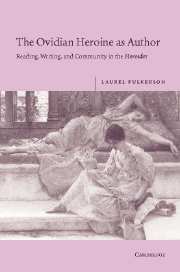Book contents
- Frontmatter
- Contents
- Acknowledgments
- List of abbreviations
- Introduction
- 1 Reading dangerously: Phyllis, Dido, Ariadne, and Medea
- 2 Reading the future?: Hypsipyle, Medea, and Oenone
- 3 Benefits of communal writing: Canace and Hypermestra
- 4 A feminine reading of epic: Briseis and Hermione
- 5 Reading magically: Deianira and Laodamia
- 6 Reading like a virgin: Phaedra and Ariadne
- 7 Caveat lector: thoughts on gender and power
- Appendix: The authenticity (and “authenticity”) of Heroides 15
- Bibliography
- Index
- Index Locorum
1 - Reading dangerously: Phyllis, Dido, Ariadne, and Medea
Published online by Cambridge University Press: 22 September 2009
- Frontmatter
- Contents
- Acknowledgments
- List of abbreviations
- Introduction
- 1 Reading dangerously: Phyllis, Dido, Ariadne, and Medea
- 2 Reading the future?: Hypsipyle, Medea, and Oenone
- 3 Benefits of communal writing: Canace and Hypermestra
- 4 A feminine reading of epic: Briseis and Hermione
- 5 Reading magically: Deianira and Laodamia
- 6 Reading like a virgin: Phaedra and Ariadne
- 7 Caveat lector: thoughts on gender and power
- Appendix: The authenticity (and “authenticity”) of Heroides 15
- Bibliography
- Index
- Index Locorum
Summary
“Had not the lady died, would there have been half so much said of it, as there is?”
(Samuel Richardson, Clarissa)We begin our study of the Heroides with Phyllis, the author of Heroides 2. In this chapter I shall suggest that, like a number of the heroines, she finds herself seduced by the stories of other women into rewriting her own. As an inexperienced heroine, she learns about the world from reading, and her reading leads her to an inescapable – and unfortunately incorrect – conclusion. For she will determine that she is an abandoned heroine, and will therefore needlessly commit suicide. At the same time, she displays a surprising degree of control over her material, marshalling literary heavyweights like Dido, Ariadne, and Medea in the service of forcing her story into a new mold.
Phyllis is a mythical character about whom little is unambiguously known, despite her frequent appearance in mythology. She is a Thracian princess, seduced and abandoned by Demophoon, her faithless Athenian guest. In every version of the tale available to us she kills herself: the story is a not untypical tale of unhappy love, similar in outline to the stories of many other women in the Heroides. It is, in fact, precisely Phyllis' similarities to other women that form a key feature of her poem; the interpretation of Heroides 2 here offered suggests that Phyllis' empathetic familiarity with these other stories causes her to refashion herself in their image.
- Type
- Chapter
- Information
- The Ovidian Heroine as AuthorReading, Writing, and Community in the Heroides, pp. 23 - 39Publisher: Cambridge University PressPrint publication year: 2005



